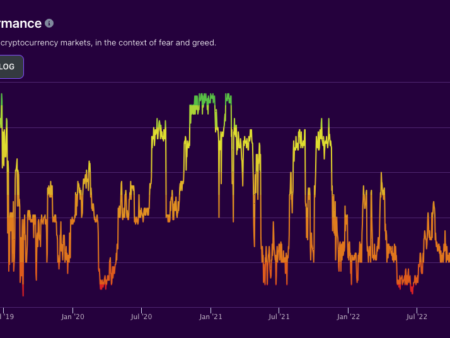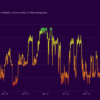Bitcoin Cash bulls seemed to vanish after showing promise in mid-October. With such a strong performance earlier, you’d expect more buyers to jump in, right? But that hasn’t really been the case.
Should You Still Buy Into Bitcoin Cash After the Bounce?
Looking at BCH ownership and address stats, should you still consider buying into Bitcoin Cash [BCH] after its bounce earlier this month? Usually, when there’s a big bullish move in a single day, it’s seen as whale accumulation. BCH did experience such a move about a week ago, but after that, it kinda lost steam.
Bitcoin Cash has slowly been climbing back from its local lows in August, signaling a potential recovery from its previous dip. The price spike on 14th October brought some excitement back to the market, with hopes of continued growth. But since then, the demand hasn’t really been there. BCH hasn’t pushed much higher, indicating weaker demand, though the selling pressure hasn’t been too harsh either. As a result, BCH has managed to hold on to most of its mid-month gains. At press time, Bitcoin Cash was trading at $258.6.
Broader Crypto Market Takes a Hit
Meanwhile, Bitcoin and other big cryptocurrencies took a hit as the leading crypto dropped below $67,000. This came after a failed attempt to break through the $70,000 barrier during early Asian trading hours. Ouch, right?
Bitcoin, the largest cryptocurrency by market cap, dipped by 2.3% in the last 24 hours, underperforming the broader market. The overall crypto market was hit by a correction, with the total crypto market cap decreasing by 1.5%, sitting at $2.3 trillion. The market correction hit many, leaving traders wondering what’s next for their investments.
Ethereum, the second-largest crypto, wasn’t spared from the downward pressure either, slipping by almost 1%. Other big players in the market like Litecoin, Polkadot, and Internet Computer Protocol’s token didn’t fare much better, seeing losses of between 4% and 5%.
Interestingly, Solana stood out as a rare exception to this market trend, managing to gain 2.4% to hit $163, though it still fell short of its weekend high of $170. In the mining sector, TeraWulf shined with a 12% rise, backed by its recent push into AI data centers.
The broader market downturn triggered massive liquidations across crypto exchanges. Long positions, where traders bet that prices would go up, got wrecked with $171.2 million in liquidations within just 24 hours. Shorts didn’t have it quite as bad, but they still saw $30 million in losses during that same period.

bitcoin
Ethereum traders were hit particularly hard, with $58.8 million in liquidations, most of it from leveraged long positions. In total, the market-wide liquidations reached $201 million during this period, which was not a small amount by any means.
It wasn’t just the crypto market feeling the pain—traditional financial markets were also having a rough day. The U.S. stock market showed some weakness, with the Dow Jones Industrial Average dropping 344 points (about 0.8%). The S&P 500 also declined by 0.18%, coming off its recent all-time high, while the Nasdaq Composite managed to squeak out a 1.4% gain.
In addition to that, the U.S. Dollar Index hit its highest point since August at 103.67, which piled more pressure on cryptocurrency prices. The rising interest rates across Western economies added to the bearish sentiment, with both U.S. 10-year Treasury yields and German 10-year Bund yields increasing by 10 basis points.
Now, all eyes are on the Federal Reserve’s upcoming meeting set for November 6-7. According to CME Group’s FedWatch Tool, there’s currently an 89.9% chance of a 0.25% rate cut. But interestingly, the odds of a bigger 0.50% rate cut have dropped down to zero.
Bitcoin’s price movement is still following the same pattern it’s been stuck in since its all-time high of $73,700 more than seven months ago. The latest attempt to break $70,000 mirrored a failed effort in late July, which saw Bitcoin drop all the way to under $52,000.
Technical analysis suggests that the cryptocurrency market is trading within a descending parallel channel, which has been active since March 2024. The recent rally above $2.35 trillion in total market capitalization didn’t manage to break through the channel’s upper boundary at $2.36 trillion, so it was short-lived.
Despite the current weak sell pressure, it seems like the whales who bought in mid-month haven’t really cashed out yet. That’s probably a sign that they still expect prices to rise, but it doesn’t necessarily mean that BCH will continue to rally either.
But what about the on-chain data?
Well, there doesn’t seem to be any strong sign of Bitcoin Cash accumulation. Looking at ownership data, HODLer addresses have slightly increased since mid-October. As of 24th September, there were around 24.34 million HODLer addresses, and that number has now grown to 24.39 million addresses. However, the number of cruisers (those who hold for medium-term gains) took a hit, dropping from over 653,710 addresses in September to 618,460. Traders also dropped, going from 107,640 addresses to 94,820.
What’s interesting is that the shift in address activity shows a move from short-term to long-term focus. But in terms of address balances since the mid-month rally, HODLer balances actually dipped slightly, going from 11.94 million BCH to 11.93 million BCH, which might suggest that some took profits.
On the other hand, cruisers increased their holdings during the same period, growing from 6.75 million BCH to 6.8 million BCH. Traders’ balances dropped from 1.11 million BCH to 1.07 million BCH, based on the latest data.
So far, the findings don’t really give conclusive evidence that there’s been any major accumulation happening. The bullish move earlier in the month could have been an attempt to stir up some activity. And speaking of activity, Bitcoin Cash just recorded its biggest transaction spike since mid-August.
Crypto trading firm Wincent noted that upcoming quarterly earnings reports from U.S. companies could impact investor appetite for risk. The firm suggested we might see a brief pullback followed by potential new all-time highs as the U.S. elections approach.
Even with the current downward trend, funding rates for major cryptocurrencies like Bitcoin and Ethereum remain positive. This suggests that traders who are still holding positions in the market are betting on a bullish outcome and are willing to pay premiums to maintain their long positions.

bitcoin
Support Levels and Future Expectations
The technical outlook for the crypto market points to the possibility of continued correction. The number of transactions for BCH surged from around 13,000 on 20th October to over 368,000 on 21st October. However, it’s still unclear if this spike in transactions is connected to the mid-month price surge.
Despite this uncertainty, the increase in transaction activity could provide some confidence to investors. Current support levels indicate that total market capitalization could stabilize at $2.06 trillion. However, if the market continues to slide, we could see a further drop to $1.89 trillion, which would represent a 17% decline from current levels.
Overall, the market’s facing some tough challenges, but there’s still hope for a rebound, especially as the U.S. elections draw nearer and traders look to new opportunities.




















